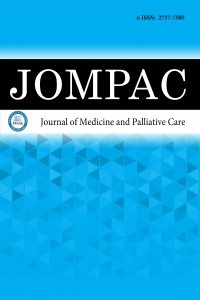1.
Hernandez J, Bamwesigye D, Horak M. Eating behaviors of university students. <em>Am J Public Health</em>. 2016;100:216-222.
2.
Ohara K, Mase T, Kouda K, et al. Association of anthropometric status, perceived stress, and personality traits with eating behavior in university students. <em>Eat Weight Disord</em>. 2019;24:521-531.
3.
Suwalska J, Kolasinska K, Lojko D, et al. Eating behaviors, depressive symptoms and lifestyle in university students in Poland. <em>Nutrients</em>. 2022;14(5):1106.
4.
Grzelak T, Dutkiewicz A, Paszynska E, et al. Neurobiochemical and psychological factors influencing the eating behaviors and attitudes in anorexia nervosa. <em>J Physiol Biochem</em>. 2017;73:297-305.
5.
Stewart MC, Schiavo RS, Herzog DB, et al. Stereotypes, prejudice and discrimination of women with anorexia nervosa. <em>Eur Eat Disord Rev</em>. 2008;16(4):311-318.
6.
Karakuş SŞ, Yıldırım H, Büyüköztürk Ş. Üç faktörlü yeme ölçeğinin Türk kültürüne uyarlanması: Geçerlik ve güvenirlik çalışması. <em>TAF Preventive Med Bullet</em>. 2016;15(3):229-237.
7.
Grossniklaus DA, Dunbar SB, Tohill BC, et al. Psychological factors are important correlates of dietary pattern in overweight adults. <em>J Cardiovasc Nurs</em>. 2010;25(6):450-460.
8.
Erden SC, Yilmaz BK, Kozaci N, et al. The relationship between depression, anxiety, and stress levels and eating behavior in emergency service workers. <em>Cureus</em>. 2023;15(2):e35504.
9.
Araiza AM, Lobel M. Stress and eating: Definitions, findings, explanations, and implications. <em>Soc Personal Psychol Compass</em>. 2018;12(4):e12378.
10.
Herman JP, McKlveen JM, Ghosal S, et al. Regulation of the hypothalamic-pituitary-adrenocortical stress response. <em>Compr Physiol</em>. 2016;6(2):603.
11.
Mooreville M, Shomaker LB, Reina SA, et al. Depressive symptoms and observed eating in youth. <em>Appetite</em>. 2014;75:141-149.
12.
Dakanalis A, Mentzelou M, Papadopoulou SK, et al. The association of emotional eating with overweight/obesity, depression, anxiety/stress, and dietary patterns: a review of the current clinical evidence. <em>Nutrients</em>. 2023;15(5):1173.
13.
Stunkard AJ, Messick S. The three-factor eating questionnaire to measure dietary restraint, disinhibition and hunger. <em>J Psychosom Res</em>. 1985;29(1):71-83.
14.
Karlsson J, Persson L-O, Sjöström L, et al. Psychometric properties and factor structure of the Three-Factor Eating Questionnaire (TFEQ) in obese men and women. Results from the Swedish Obese Subjects (SOS) study. <em>Int J Obes</em>. 2000;24(12):1715-1725.
15.
Lovibond PF, Lovibond SH. The structure of negative emotional states: comparison of the Depression Anxiety Stress Scales (DASS) with the beck depression and anxiety inventories. <em>Behav Res Ther</em>. 1995;33(3):335-343.
16.
Henry JD, Crawford JR. The short-form version of the Depression Anxiety Stress Scales (DASS-21): construct validity and normative data in a large non-clinical sample. <em>Br J Clin Psychol</em>. 2005;44(2): 227-239.
17.
Yılmaz Ö, Boz H, Arslan A. Depresyon anksiyete stres ölçeğinin (DASS 21) Türkçe kisa formunun geçerlilik-güvenilirlik çalişmasi. <em>FESA.</em> 2017;2(2):78-91.
18.
Tabachnick BG, Fidell LS. Using multivariate statistics, 6<sup>th</sup> edn Boston. <em>Ma: Pearson</em>. 2013.
19.
Paans NP, Bot M, Brouwer IA, et al. The association between depression and eating styles in four European countries: the MooDFOOD prevention study. <em>J Psychosom Res</em>. 2018;108:85-92.
20.
Prefit AB, Szentagotai-Tatar A. Depression and disordered eating behaviors: the role of emotion regulation difficulties. <em>J Evid Based Psychother</em>. 2018;18(1)
21.
Konttinen H. Emotional eating and obesity in adults: the role of depression, sleep and genes. <em>Proc Nutr Soc</em>. 2020;79(3):283-289.
22.
Macht M. How emotions affect eating: a five-way model. <em>Appetite</em>. 2008;50(1):1-11.
23.
Van Strien T. Causes of emotional eating and matched treatment of obesity. <em>Curr Diab Rep</em>. 2018;18:1-8.
24.
Doumit R, Zeeni N, Sanchez Ruiz MJ, et al. Anxiety as a moderator of the relationship between body image and restrained eating. <em>Perspect Psychiatr Care</em>. 2016;52(4):254-264.
25.
Chen J, Wang Z, Guo B, et al. Negative affect mediates effects of psychological stress on disordered eating in young Chinese women. 2012;
26.
Kalkan Uğurlu Y, Mataracı Değirmenci D, Durgun H, et al. The examination of the relationship between nursing students’ depression, anxiety and stress levels and restrictive, emotional, and external eating behaviors in COVID-19 social isolation process. <em>Perspect Psychiatr Care</em>. 2021;57(2):507-516.
27.
Madalı B, Alkan ŞB, Örs ED, et al. Emotional eating behaviors during the COVID-19 pandemic:a cross-sectional study. <em>Clin Nutr ESPEN</em>. 2021;46:264-270.
28.
Groesz LM, McCoy S, Carl J, et al. What is eating you? Stress and the drive to eat. <em>Appetite</em>. 2012;58(2):717-721.
29.
Zakhour M, Haddad C, Sacre H, et al. Differences in the associations between body dissatisfaction and eating outcomes by gender? A Lebanese population study. <em>Rev Epidemiol Sante Publique</em>. 2021;69(3):134-144.
30.
Smith JM, Serier KN, Belon KE, et al. Evaluation of the relationships between dietary restraint, emotional eating, and intuitive eating moderated by sex. <em>Appetite</em>. 2020;155:104817.
31.
Lee S. The Relationship between coping style for stress and emotional eating behavior by gender difference. <em>Korean J Community Nutr</em>. 2018;33(1):11-17.
32.
Filippone L, Shankland R, Hallez Q. The relationships between social media exposure, food craving, cognitive impulsivity and cognitive restraint. <em>J Eat Disord</em>. 2022;10(1):184.
33.
Işgın K, Pekmez CT, Kabasakal A, et al. Adölesanlarda duygusal yeme, kontrolsüz yeme ve bilişsel yeme kısıtlaması davranışları ile vücut bileşimi arasındaki ilişkinin değerlendirilmesi. <em>Beslenme ve Diyet Derg</em>. 2014;42(2):125-131.
34.
Taş E, Kabaran S. Sezgisel yeme, duygusal yeme ve depresyon: Antropometrik ölçümler üzerinde etkileri var mı. <em>Sağlık ve Toplum</em>. 2020;20(3):127-139.
35.
Asil E, Yilmaz MV, Bodur M, et al. The effect of emotional eating on body weight and eating habits in adults. <em>Med Sci</em>. 2022;11(3)
36.
Walker-Clarke A, Walasek L, Meyer C. Psychosocial factors influencing the eating behaviours of older adults: a systematic review. <em>Ageing Res Rev</em>. 2022;77:101597.
37.
Leon E, Tabares M, Baile JI, et al. Eating behaviors associated with weight gain among university students worldwide and treatment interventions: a systematic review. <em>J Am Coll Health</em>. 2024;72(5):1624-1631.

